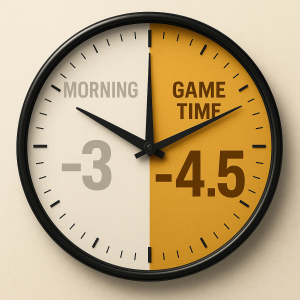 Sports bettors know that timing can be just as important as picking the right side. Odds aren’t static. They move as sportsbooks react to action, injury news, weather updates, and late information. That leaves bettors with a choice: lock in early lines in the morning or wait until closer to game time. Both strategies have advantages, but which one is smarter depends on what you value most: value, information, or flexibility—something that even players on casino sites consider when deciding how to approach their bets.
Sports bettors know that timing can be just as important as picking the right side. Odds aren’t static. They move as sportsbooks react to action, injury news, weather updates, and late information. That leaves bettors with a choice: lock in early lines in the morning or wait until closer to game time. Both strategies have advantages, but which one is smarter depends on what you value most: value, information, or flexibility—something that even players on casino sites consider when deciding how to approach their bets.
Why Odds Move
Before comparing approaches, it’s important to understand why lines shift. Sportsbooks open with numbers based on models, historical matchups, and power rankings. Once posted, professional bettors—often called “sharps”—test those numbers. Their early action can push the line one way or another.
As the day goes on, sportsbooks also adjust for public betting trends. If a large volume of money piles up on one side, the line shifts to balance risk. Add in breaking news—an unexpected scratch, weather changes, or lineup adjustments—and odds can look very different from where they started.
Betting the Morning Line
Placing bets in the morning can be appealing for one main reason: value.
1. Capturing soft numbers
Opening lines can be less efficient. Books don’t yet have much betting data, so mistakes happen. Sharps often target these early numbers to grab value before the line “sharpens” throughout the day. For example, a football team might open at -3, but heavy early action could move it to -4.5 by kickoff. The bettor who got in at -3 has a clear advantage.
2. Beating the public
Morning bets also avoid the influence of public money. Recreational bettors often place wagers later in the day, especially before prime-time games. That late flood can inflate favorites and skew totals. Morning bettors can sidestep this distortion.
3. Downsides of betting early
The risk is information. When you bet in the morning, you don’t yet know if a star player might sit out or if the weather could affect the game. A bet placed early can lose value fast. Locking in too soon also removes flexibility—you can’t react to new developments.
Waiting for Game-Time Odds
On the other hand, waiting until just before the game has its own advantages.
1. Full information
By game time, you know far more than you did in the morning. Starting lineups are confirmed. Injury statuses are official. Weather forecasts are accurate. If your priority is certainty, waiting pays off.
2. Exploiting late moves
Sometimes odds swing too far. If public money drives a line beyond reason, bettors who wait can take advantage of it. For instance, if the Lakers open as 5-point favorites and the public pushes the line to 7.5, a late bettor might find value backing the underdog at a number not available earlier.
3. Downsides of waiting
The biggest drawback is losing the best number. By the time you act, the line may have shifted against you. If a team opened at +6 and is down to +4 by tip-off, the value is gone. You’re paying a worse price for the same outcome.
Which Approach is Smarter?
There isn’t a single “right” answer—it depends on your betting style.
For sharp bettors or line shoppers
Morning odds usually offer more opportunity. Professionals thrive on identifying soft numbers and grabbing them before the market adjusts. The early hours reward those who track line movement and act quickly.
For casual or information-first bettors
Waiting until game time is often safer. If you don’t have the time or tools to monitor injury reports, betting early can be risky. Being armed with full information helps level the playing field.
Hybrid Strategies
Many bettors blend both approaches. A common strategy is to lock in early when you spot clear value, but hold off when uncertainty looms. For example:
- Bet early if you believe a line is mispriced and likely to move in your favor.
- Wait, if injuries, weather, or public influence could swing the number closer to your advantage.
Line shopping also helps. Different sportsbooks can have different prices at the same time, whether on morning or game day.
Practical Example
Consider an NFL Sunday game. The Chiefs open at -3 on Monday morning. Early sharp action pushes them to -4.5 by Saturday.
- A bettor who grabbed -3 early has the best of it. Even if the Chiefs win by four, that early bet cashes while a late bet loses.
- Another bettor, skeptical of Patrick Mahomes’ injury status, waits until Sunday. By then, Mahomes is confirmed as healthy, and the line has climbed. That bettor may have missed value, but at least they avoided betting blind on an uncertain injury.
This clearly illustrates the trade-off: early bets can lock in value, but late bets benefit from certainty.
Final Thoughts
Morning odds and game-time odds both have their place. Morning bets reward sharpness, research, and speed. Game-time bets reward patience and risk management. Neither is inherently smarter—it depends on whether you prioritize value or information.
The best bettors learn to use both. Sometimes the early number is worth grabbing. Other times, it pays to wait and let the market settle. Success comes from knowing which situation calls for which approach.


